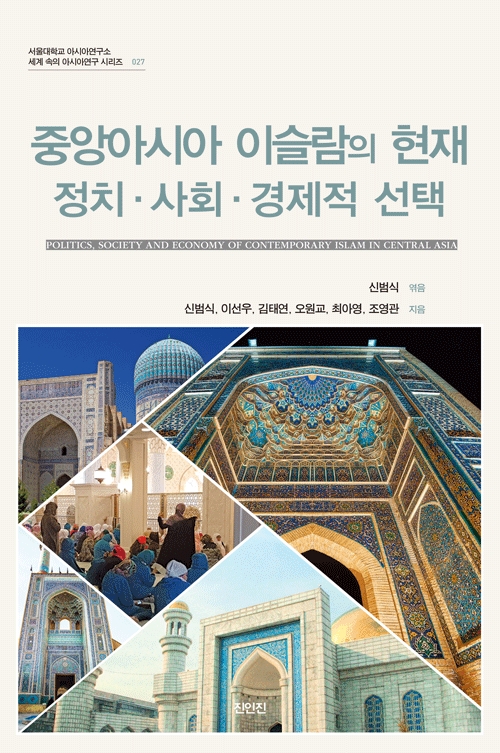Politics, Society and Economy of Contemporary Islam in Central Asia

- Editor: Beomshik Shin
- Authors: Beomshik Shin, Sunwoo Lee, Taeyeon Kim, Won-kyo Oh, A-young Choi, Young Gwan Cho
- Publication Date: February / 2020
- Publisher: Zininzin
A study on the situation of Islam in Central Asia from political, social, and economic aspects, Politics, Society and Economy of Contemporary Islam in Central Asia has been published as the 27th book in the SNU Asian Studies in a Global Context Series. Along with the 26th book in the series, Historical and Cultural Experience of Islam in Central Asia, this book is a result of 2-year-long research that SNUAC Center for Eurasian and Central Asian Studies executed from 2015 to 2017, under the topic ‘Historical experience and current choices of Islam in Central Asia’, and presents a new prospect in Islam and Central Asian studies in Korea.
The main perspective of the research is based on the diversity of Islam, the correlation of Islam as a religion and its nationalism, and the relationship of Islam and its system, and the research traces the historical process of Islam being spread in Central Asia, thus the formation of the modern state and its exchange of influences in politics, society, and economy in its encounter with communism.
Politics, Society and Economy of Contemporary Islam in Central Asia also comprises of 9 papers as with the previous book, and 6 researchers in total have participated.
In the introductory chapter written by the editor and co-author of this book, Prof. Beomshik Shin (Dept. of Political Science & International Relations), a survey of the research is given as well as the achievements and limitations of the book.
In section 1 that deals with the politics of Islam, ‘Islam and Nation-Building’, there are three papers on Uzbekistan and Kazakhstan’s processes of building the nation after independence.
In section 2, there are 4 papers that analyze the cultural influence of Islam in Central Asian society from perspectives of the potential and exportability of Islam extremism, the awareness of residents and lifestyles of the youth.
Section 3 analyzes the Islam influence on Central Asian economy mainly through finances and the Halal industry, with 2 papers.
SNUAC Center for Eurasian and Central Asian Studies and Zininzin have recorded the research achievements in Central Asian studies in Korea through China’s Rise and Central Asia (2015), The Heart of Eurasian Beats Again: The Historic Formation and Dynamics of Central Asia (2017), and Islam after Communism: Religion and Politics in Central Asia (2019, translation). We hope that the recent publications of Historical and Cultural Experience of Islam in Central Asia and Politics, Society and Economy of Contemporary Islam in Central Asia will respond to the rising interests in Central Asia as an opportunity to further the understanding in the region.
